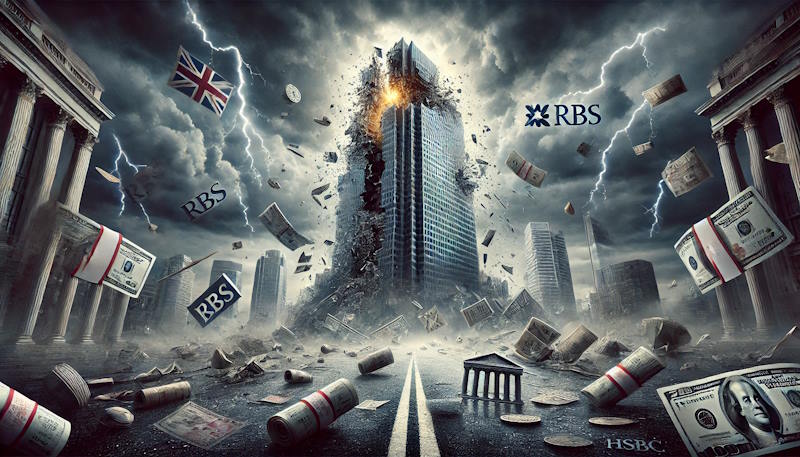Banksters "Crooks in Suits" verses. Gangsters "Crooks in Stripes":
Public sentiment often echoes the adage that Give a man a gun and he can rob a bank, AKA Gangster but Give a man a bank, and he can rob the world, AKA Bankster a term reflecting a deep-seated mistrust of the financial sector. History has repeatedly demonstrated this notion, with numerous instances where bankers or financial institutions have engaged in practices that could be considered detrimental to the economy or the public at large, leading to significant financial crises or scandals.
The Cost of Doing Business:
However, the disparity in justice is stark. While the Gangster "the man with a gun" faces swift legal repercussions, often ending up in prison, the Bankster "the man with a bank" is typically met with fines rather than criminal charges. This approach suggests a two-tier justice system where financial malfeasance by bankers is penalized through monetary penalties, which some argue are merely the cost of doing business, while the government seems more interested in securing a share of the financial gain rather than pursuing criminal accountability. This perception fuels the belief that the justice system disproportionately favours those in financial power, thereby confirming the public's cynical view of banking ethics.
The Price of Greed:
The scope of fraud and misconduct that led to these institutions being fined. Their actions in misleading investors, manipulating markets, and misrepresenting the quality of financial products all played significant roles in the events leading up to and during the 2008 financial crisis.

BANKS FINED IN THE US
The Untouchables of the 21st Century:
1. Goldman Sachs
• Fine Amount: $5 billion (settlement with the U.S. government in 2016).
• CEO at the time: Lloyd Blankfein (2006–2018).
• Reason: Goldman Sachs faced charges for its role in misleading investors regarding the risk of mortgage-backed securities (MBS) that were created from subprime mortgages. The bank packaged these securities and sold them to investors while simultaneously betting against them by taking short positions. Goldman Sachs failed to disclose the conflicts of interest, causing investors to lose billions of dollars when the housing market collapsed. The settlement was part of an agreement to resolve civil claims related to these practices.
2. JP Morgan Chase
• Fine Amount: $13 billion (settlement with the U.S. government in 2013).
• CEO at the time: Jamie Dimon (2005–present).
• Reason: JPMorgan Chase was accused of deceptive practices surrounding the sale of mortgage-backed securities (MBS), particularly those linked to subprime loans. The bank sold these risky securities to investors, misrepresenting their quality and the level of risk involved. JPMorgan's conduct contributed to the housing bubble and subsequent crash, leading to widespread financial instability. The settlement resolved both civil claims and allegations that the bank had failed to adequately disclose the risks of the MBS products it was offering.
3. Bank of America
• Fine Amount: $16.65 billion (settlement with the U.S. government in 2014).
• CEO at the time: Brian Moynihan (2009–present).
• Reason: Bank of America, through its acquisition of Countrywide Financial and Merrill Lynch, was deeply involved in the creation and sale of toxic mortgage-backed securities. These securities were based on high-risk subprime mortgages that were sold to investors without adequately disclosing the risks. Additionally, Bank of America engaged in foreclosure practices that violated consumer protection laws, making the settlement the largest by any financial institution related to the mortgage crisis.
4. Citigroup
• Fine Amount: $7 billion (settlement with the U.S. government in 2014).
• CEO at the time: Vikram Pandit (2009–2012).
• Reason: Citigroup faced accusations of misleading investors by misrepresenting the quality of mortgage-backed securities it sold before and during the 2008 financial crisis. The bank failed to disclose the risks of the subprime mortgage-backed securities, which led to massive financial losses for investors when the housing market collapsed. Citigroup also faced allegations of inadequate oversight and poor risk management in the creation of these financial products.
5. Deutsche Bank
• Fine Amount: $7.2 billion (settlement with the U.S. government in 2017).
• CEO at the time: John Cryan (2015–2018).
• Reason: Deutsche Bank was fined for its involvement in the creation and sale of mortgage-backed securities, which contained subprime loans that contributed to the housing bubble and financial collapse. The bank misled investors about the quality of these securities, overstating their safety while knowing they were high-risk. Deutsche Bank was also found to have failed in adequately vetting the mortgages underlying these securities, leading to investor losses when the mortgage market collapsed.
6. Barclays
• Fine Amount: $2 billion (settlement with the U.S. government in 2015).
• CEO at the time: John Varley (2004–2010).
• Reason: Barclays was implicated in the sale of mortgage-backed securities that contained risky subprime loans. The bank was accused of failing to disclose the true risks of these products to investors, contributing to the collapse of the housing market. Barclays also faced allegations of mismanagement and improper conduct in structuring and selling these securities, which ultimately led to significant losses for investors.
7. Royal Bank of Scotland (RBS)
• Fine Amount: $4.9 billion (settlement with the U.S. government in 2018).
• CEO at the time: Fred Goodwin (2001–2009).
• Reason: RBS was involved in the creation and sale of mortgage-backed securities based on subprime loans. The bank misrepresented the quality of these securities to investors, while failing to disclose the high levels of risk involved. The collapse of these products contributed to the 2008 financial crisis, and RBS faced fines for its role in misleading investors, inadequate risk management, and misrepresentation of its mortgage-backed products.
8. UBS
• Fine Amount: $1.5 billion (settlement with the U.S. government in 2012).
• CEO at the time: Oswald Grübel (2002–2011).
• Reason: UBS was fined for its role in manipulating the LIBOR (London Interbank Offered Rate), an interest rate benchmark that affects global financial markets. Additionally, UBS faced fines for its involvement in the creation and sale of mortgage-backed securities based on subprime mortgages. The bank misled investors about the risks associated with these products, contributing to the financial crash. The fine also addressed UBS's role in the illegal manipulation of financial benchmarks.
9. Morgan Stanley
• Fine Amount: $2.6 billion (settlement with the U.S. government in 2016).
• CEO at the time: James Gorman (2010–present).
• Reason: Morgan Stanley was fined for its involvement in the creation, packaging, and sale of mortgage-backed securities, which were based on risky subprime loans. The bank misrepresented the quality of these products to investors, while knowing the securities were high-risk and likely to fail when the housing market collapsed. The fine was part of a broader effort to hold banks accountable for misleading investors about the quality of their mortgage-backed securities.
10. Wells Fargo
• Fine Amount: $1 billion (settlement with the U.S. government in 2018).
• CEO at the time: John Stumpf (2007–2016).
• Reason: In addition to fraudulent account openings, Wells Fargo was fined for its role in the creation and sale of toxic mortgage-backed securities before and during the 2008 financial crisis. The bank was accused of misleading investors about the quality and safety of these securities, and its involvement in the securitization of high-risk subprime mortgages contributed to the financial crisis. Wells Fargo also faced allegations of improper foreclosure practices and consumer abuse.
11. HSBC
• Fine Amount: $1.9 billion (settlement with the U.S. government in 2012).
• CEO at the time: Stuart Gulliver (2011–2018).
• Reason: HSBC was fined for violating U.S. sanctions by facilitating illegal transactions with countries such as Iran and Libya. The bank was also involved in the creation and sale of mortgage-backed securities, which were largely based on subprime mortgages. HSBC misled investors about the risks associated with these products, and the bank's failure to manage its financial products appropriately contributed to the financial crisis.
12. Standard Chartered
• Fine Amount: $1.1 billion (settlement with U.S. and U.K. regulators in 2019).
• CEO at the time: Peter Sands (2006–2015).
• Reason: Standard Chartered was fined for violations related to money laundering, as well as its role in the financial crisis. The bank was implicated in facilitating transactions with sanctioned countries, and also faced scrutiny for misleading investors regarding mortgage-backed securities. The fine was part of a larger regulatory settlement that addressed both the bank's involvement in the crisis and its non-compliance with financial regulations.
13. Credit Suisse
• Fine Amount: $2.6 billion (settlement with U.S. government in 2016).
• EO at the time: Brady Dougan (2007–2015).
• Reason: Credit Suisse was fined for its role in the creation and sale of mortgage-backed securities that were based on subprime loans. The bank misrepresented the risks of these securities to investors, knowing that they were far more likely to default than disclosed. Credit Suisse's failure to properly assess the risks and its misleading actions in marketing these products led to significant losses for investors when the housing market collapsed.
14. BNP Paribas
• Fine Amount: $8.9 billion (settlement with U.S. government in 2014).
• CEO at the time: Jean-Laurent Bonnafé (2003–present).
• Reason: BNP Paribas was fined for violating U.S. sanctions by conducting illegal transactions with countries like Sudan, Iran, and Cuba. The bank was also involved in the sale of mortgage-backed securities, many of which were linked to subprime mortgages. BNP Paribas failed to disclose the risks associated with these products to investors, which contributed to the wider financial instability during the 2008 crisis.
15. Lloyds Banking Group
• Fine Amount: $370 million (settlement with the U.S. government in 2015).
• CEO at the time: António Horta-Osório (2011–2021).
• Reason: Lloyds Banking Group was fined for its role in manipulating the LIBOR interest rate, a critical benchmark for global financial transactions. Additionally, the bank was involved in the creation and sale of mortgage-backed securities, many of which contained high-risk subprime loans. Lloyds failed to properly disclose the risks to investors, which contributed to the widespread financial losses during the 2008 crisis.

BANKS FINED IN THE UK
The UK government-imposed fines on several banks and financial institutions for misconduct related to the 2008 financial crisis, as well as for other regulatory violations and mismanagement that occurred in the years following the crisis. Below are some notable examples of UK-based banks that faced penalties:
1. Royal Bank of Scotland (RBS)
• Fine Amount: £4.9 billion (settlement with the U.S. government in 2018, but also faced UK regulators).
• Reason: RBS was fined for its involvement in the creation and sale of toxic mortgage-backed securities, many of which were linked to subprime mortgages. The bank misled investors about the risks associated with these securities, contributing to the global financial collapse. RBS was also involved in misconduct related to its role in the 2008 crisis, with the UK government later taking a controlling stake in the bank through a bailout.
2. Barclays
• Fine Amount: Barclays faced fines for several regulatory violations, including a £290 million fine from the UK Financial Services Authority (FSA) in 2012 for its role in the LIBOR (London Interbank Offered Rate) interest rate manipulation scandal.
• Reason: Barclays was involved in manipulating LIBOR, which affected global financial markets, including loan agreements, mortgages, and derivatives. The manipulation aimed at inflating or deflating interest rates to benefit Barclays' positions in the financial markets. Additionally, Barclays was implicated in the sale of risky mortgage-backed securities during the run-up to the financial crisis.
3. HSBC
• Fine Amount: £1.2 billion (settled with U.S. authorities in 2012, also faced UK regulatory scrutiny).
• Reason: HSBC was fined for failing to prevent money laundering activities that involved clients in countries under sanctions, such as Iran, Sudan, and Libya. The bank was also involved in the creation and sale of mortgage-backed securities and faced allegations of mishandling consumer mortgages. The UK government and the Financial Services Authority (FSA) conducted investigations, but the fine and regulatory actions were largely focused on the money-laundering violations.
4. Lloyds Banking Group
• Fine Amount: £370 million (settlement with the U.S. government in 2015).
• Reason: Lloyds was fined for its role in the manipulation of LIBOR, which is a crucial global interest rate benchmark. The fine was part of a broader effort to hold banks accountable for their involvement in financial misconduct. The UK government, as a major shareholder in Lloyds due to the bailout, was also involved in scrutiny of the bank's practices.
5. Standard Chartered
• Fine Amount: £1.1 billion (settlement with U.S. and UK regulators in 2019).
• Reason: Standard Chartered faced fines for violating U.S. sanctions by conducting illegal transactions with countries like Iran and Libya. The bank also faced penalties for failing to comply with anti-money laundering regulations. The UK Financial Conduct Authority (FCA) and other regulators imposed these fines.
7. Other UK Banks
• Other banks operating in the UK, including Nationwide, Santander UK, and Clydesdale Bank, faced smaller fines or regulatory sanctions related to the financial crisis, particularly regarding the mis-selling of products or non-compliance with consumer protection laws. However, these fines were less significant compared to those faced by the global banking giants like RBS, Barclays, and HSBC.
The Financial Services Authority (FSA)
• Reason: The UK's Financial Services Authority (FSA), which was responsible for regulating banks before it was replaced by the Financial Conduct Authority (FCA) in 2013, imposed fines on various banks for misconduct, including mis-selling financial products, market manipulation, and failing to comply with prudential standards. The FSA's actions in the aftermath of the financial crisis helped enforce more stringent regulations on financial institutions.
Key Points on UK Government Involvement:
• The UK government, through its financial regulators, imposed penalties on banks for a range of misconducts, including market manipulation, money laundering, and improper financial practices related to the crisis.
• The UK government also took direct action by bailing out several banks, including RBS and Lloyds, using taxpayer funds. In exchange, these banks were required to restructure, improve governance, and comply with new regulations to prevent future risks to the financial system.
While the fines imposed by the UK government were significant, they were largely focused on specific issues like market manipulation (e.g., LIBOR), money laundering, and breaches of regulatory requirements rather than directly tied to the widespread fraud involving mortgage-backed securities that led to the global financial collapse. However, the UK's regulatory agencies worked closely with U.S. authorities, which imposed more substantial fines on banks for their role in the mortgage securities scandal.


